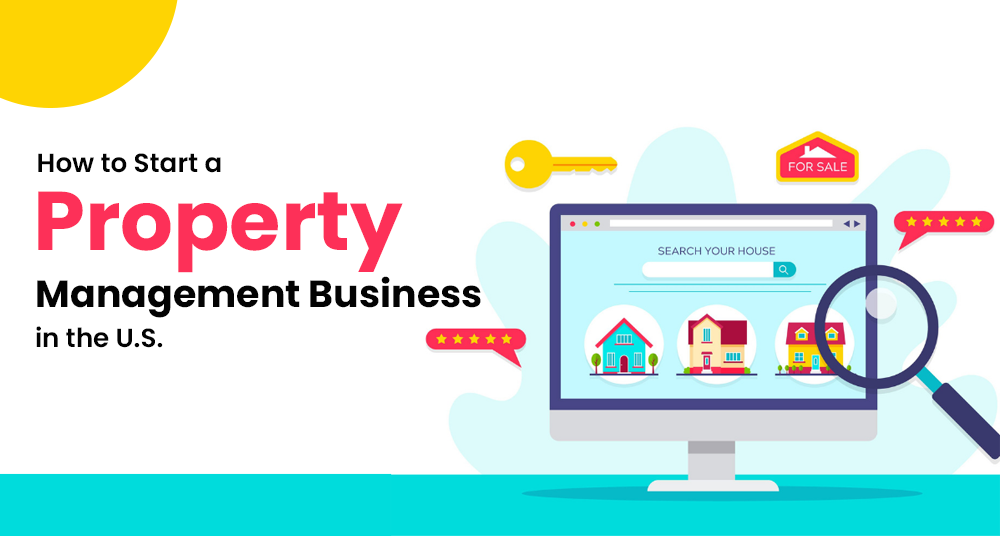Starting a property management company in the U.S. can be a great business idea, especially with so many people renting homes and investing in real estate. As a property manager, you help owners take care of their properties, find good tenants, and handle day-to-day tasks like rent collection and repairs. If you’re wondering how to get started, this step-by-step guide will walk you through everything—from legal setup to finding your first clients.
What Does a Property Management Company Do?
Step-by-Step Breakdown:
- Find Tenants
They advertise the property, show it to people, and choose reliable tenants. - Screen Tenants
They check tenants’ background, credit, and rental history before approving. - Collect Rent
They make sure rent is collected on time and handle late payments if needed. - Handle Repairs & Maintenance
They fix problems like plumbing, electrical issues, or broken appliances. - Manage Tenant Issues
They respond to questions or complaints and help resolve disputes. - Take Care of Paperwork
They prepare lease agreements, keep financial records, and provide reports to property owners. - Ensure Legal Compliance
They follow local laws, safety codes, and eviction rules to avoid legal trouble.
Check State Licensing and Legal Requirements
Check Your State’s Rules
Every U.S. state has its own laws for property managers. Some require a real estate license; others don’t.
Apply for a Real Estate License (If Required)
In many states, managing property for others means you must have a real estate broker or salesperson license.
Get a Business License
Register your company with your city or county. You may need a general business license to operate legally.
Choose a Business Structure
Decide whether you want to run your business as an LLC, sole proprietorship, or corporation. Many small businesses choose an LLC for legal protection.
Obtain Liability Insurance
Insurance helps protect your business in case of property damage, accidents, or legal claims.
Check for Special Permits or Local Rules
Some cities require additional permits, especially for managing vacation rentals or multi-unit buildings.
Stay Compliant
Keep track of renewal dates for licenses, maintain clear financial records, and follow landlord-tenant laws.
Create a Property Management Business Plan
Before you launch your business, it’s important to have a clear plan. A property management business plan helps you stay organized and focused. It includes details like what type of properties you’ll manage (residential, vacation rentals, commercial), how much you’ll charge, what services you’ll offer, and how you’ll find clients. It also helps you estimate your costs and expected income. With a solid plan in place, you’ll be better prepared to grow your business and avoid common mistakes.
Build Your Brand and Online Presence
Your brand is how people will recognize and remember your business. Start by choosing a professional name, creating a logo, and picking brand colors. Then, build a strong online presence. This includes a clean, mobile-friendly website that explains your services, shows your contact info, and allows property owners or tenants to reach you easily. You should also create social media profiles and list your business on Google. A strong brand and online presence help build trust and attract more clients.
Invest in the Right Tools and Software
Running a property management business involves many daily tasks—like collecting rent, handling maintenance requests, talking to tenants, and keeping financial records. Doing all of this by hand can be time-consuming and stressful. That’s why using the right tools and software is so important. Property management software helps you stay organized and saves you time. With the right system, you can manage rental payments, send reminders, track repairs, and store documents—all in one place. You can also use mobile apps to respond quickly to tenant issues and keep owners updated.
If you’re just starting and need help setting up the right tools, Synarion IT Solutions can support you. We create custom websites, mobile apps, and software for property management businesses. Whether you want a tenant portal, payment system, or full digital setup—we build solutions that match your business goals and help you grow faster.
Market Your Property Management Business
Once your business is set up, you need to let people know about it. Marketing helps you reach property owners who need your services. Start by creating a professional website and listing your business on Google so people can find you online. You can also promote your services on social media platforms like Facebook, Instagram, and LinkedIn. Joining local real estate groups or networking with real estate agents can also help you find clients. You may also try running online ads or offering discounts to your first few clients. The more people who hear about your business, the faster you’ll grow.
Start Managing Properties and Deliver Great Service
Once everything is set up, it’s time to start managing properties. You can begin with just one or two and grow over time. Focus on doing a great job—keep the property in good condition, respond quickly to tenant issues, and make sure rent is collected on time. Happy tenants are more likely to stay longer, and satisfied property owners may refer you to others. Good service builds your reputation, which is one of the most important parts of growing a successful property management business.
Grow Your Property Portfolio from Scratch
Starting with zero properties can feel challenging, but it’s completely possible to grow your portfolio step by step. In the beginning, focus on networking. Reach out to friends, family, and local real estate investors—let them know you’ve started a property management business. Offer to manage a property at a discounted rate or even for free, just to build trust and gain experience. Use online platforms like Craigslist, BiggerPockets, and Facebook real estate groups to connect with landlords looking for help.
As you manage your first few properties, focus on giving excellent service. Happy clients are likely to recommend you to others, helping you grow through word of mouth. You can also create referral programs to encourage current clients to bring in new ones. Over time, use client testimonials and real results to build your credibility.
Also, don’t forget to market consistently. Keep your website updated, post regularly on social media, and share your success stories. As your reputation grows, so will your portfolio. Starting small is not a weakness—it’s the first step toward building a strong, trusted property management brand.
Final Thoughts on Starting a Property Management Business
Starting a property management business in the U.S. may seem overwhelming at first, but with the right steps, it’s a rewarding and profitable path. From setting up your legal structure to building your brand and finding your first clients, every step brings you closer to success. Focus on providing great service, using smart tools, and growing at your own pace. Whether you’re starting with one property or aiming for a large portfolio, consistency and professionalism will set you apart. With the right mindset and strategy, you can build a strong, long-term business in the property management industry.
Frequently Asked Questions (FAQs)
1. Do I need a license to start a property management company in the U.S.?
Yes, most states require you to have a real estate license or property management certification. Be sure to check your specific state’s requirements.
2. How much does it cost to start a property management business?
Startup costs can range from $10,000 to $20,000, depending on your location, business size, licensing fees, insurance, and marketing expenses.
3. Can I start a property management company with no experience?
Yes, you can start without experience, but it helps to learn about real estate, local laws, and property management basics. You can also take short courses or get certified.
4. How do I find my first clients?
Start by networking with friends, family, and local real estate investors. Use online platforms, social media, and offer your services at a discounted rate to build trust and experience.
5. What software do property managers use?
Popular tools include Buildium, AppFolio, and Rentec Direct. You can also get custom-built software and apps tailored to your needs from companies like Synarion IT Solutions.
6. Can I manage properties remotely?
Yes, with the right tools and digital systems, you can manage tasks like rent collection, maintenance requests, and tenant communication from anywhere.
Useful Resource: How to Start a Taxi Business in USA






What do you think?
It is nice to know your opinion. Leave a comment.